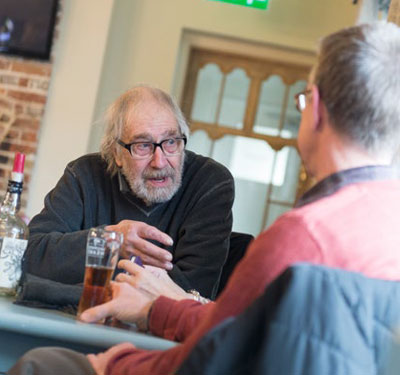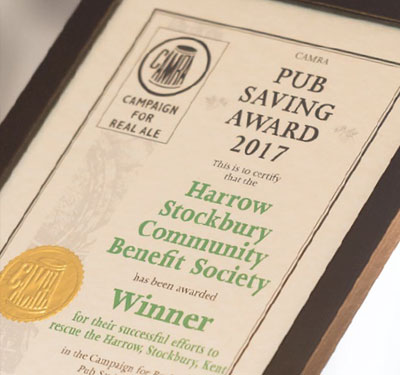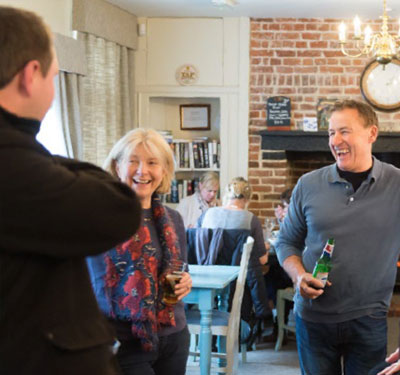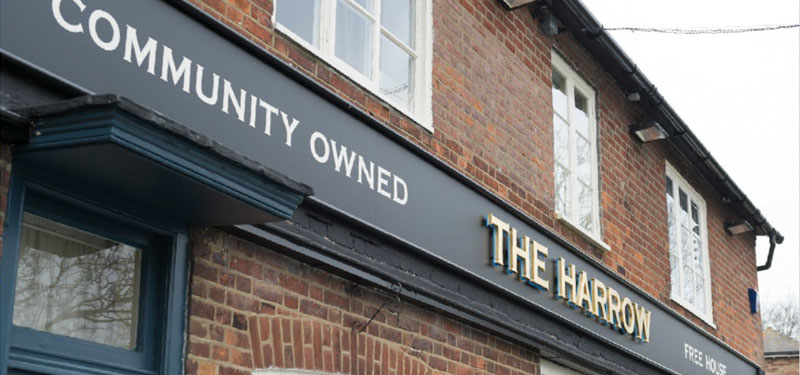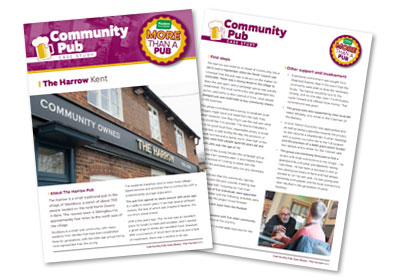Total Raised in Community Shares
£187,000
Share price
£200
Official opening date
Population area served
700
Number of shareholders
156
Legal structure
Community Benefit Society
Freehold / Lease Price
£310,000
About The Harrow Pub
The Harrow is a small traditional pub in the village of Stockbury, a parish of about 700 people located on the rural North Downs in Kent. The nearest town is Sittingbourne, approximately four miles to the north east of the village.
Stockbury is a small rural community, with many residents from families that have been established there for generations, with the older age groups being more represented than the young.
The residents therefore tend to need more villagebased services and activities than a community with a predominantly younger population.
The pub first opened its doors around 200 years ago, but sadly in recent years it has had several different owners, the last of which was Shepherd Neame, the country’s oldest brewer.
Until a few years ago, The Harrow was an excellent place for locals to meet and socialise, and it served a good range of drinks and excellent food. However, after a succession of short term tenancies and a lack of investment, there was a decline in its use.
The group commissioned a survey to establish what villagers might want and need from the pub; they asked residents how they might use the pub and what they would like it to provide. The results indicated a desire for good local food, reasonable prices, a social atmosphere, a café during the day, the provision of midweek lunches and a family room. Over half of the responses were from people aged 56 years old and over, with 20% over the age of 70.
The results of the survey helped the campaign group to formulate their business plan. It also helped them to identify sources of funding to assist with the purchase of the premises and carry out any necessary refurbishments.
Having established that the community had the appetite to acquire the pub, a public meeting was held in the village hall. Following on from that meeting, a group of five individuals were appointed to form a committee and the following activities were highlighted to help the project move forward:
• Discussions and input from the Plunkett Foundation.
• Detailed discussions with five other community owned pubs around the country.
• Development of a sustainable business for the long term.
• The group were also supported by their local MP, Helen Whately, who wrote to the Chairman of the Brewery.
• A local District Councillor was approached and as well as being supportive towards the project, he also became a shareholder. Further meetings with a county councillor led to her full support and the provision of a £600 grant which funded two laptops and a printer for the internet café.
• The group was extremely fortunate to find a tenant with local connections to the village – his grandparents and great grandparents having lived there. He had been a successful chef at two prestigious hotels in Kent and had always wanted to run his own pub. He was young and extremely enthusiastic and his local connections have resulted in the generation of extra business.
1. Acquire sufficient funds to be able to both buy The Harrow and refurbish it to the required standards.
2. Ensure widespread involvement (share ownership) by having an affordable entry level and equal rights for all shareholders irrespective of number of shares owned.
3. Involve Shepherd Neame at an early stage and throughout the process to ensure that the pub was sold to the community and to gain valuable information which would help to put together a financial plan.
4. Develop a financial plan which was achievable, viable and enabled long-term stability.
5. Make The Harrow the social hub of the community with activities over and above those of a standard pub.
The group felt it was vital to involve Shepherd Neame throughout the whole process. The Brewery was contacted as soon as the sale of the pub was announced and a very useful working relationship was established.
The remaining finance was secured from shareholders who, in addition to the purchasing shares to the tune of £187,000, were asked to loan at least £10,000 over three years for a return of 4% per annum to be payable at the end of the term along with the capital. This was considered to be a lower cost option compared to a commercial loan. At the end of the period, the Society intends to replace the shareholder loans of £120,000 with a mortgage, which they envisage might be easier to arrange once three years’ of trading figures are available.
Most of the refurbishment work was carried out by volunteers and the transformation, both to the pub and the upstairs accommodation, was remarkable and helped to reduce costs.
Chris Porter, Chair of the Harrow Community Benefit Society Group, said: “It was a fantastic achievement to save this pub from closure, thanks to the help of hundreds of people – stakeholders, villagers, councillors, press, MPs and groups like Pub is the Hub and Plunkett.”
Paul Ainsworth, who organised CAMRA’s Pub Saving Award added: “The Harrow CBS group used every tool available to save their beloved pub from closure, and it is an absolute delight to celebrate this with our Pub Saving Award. Once a pub is closed, it is too often lost forever and their success should be a great inspiration to other communities faced with losing their local pubs really can be saved.”
• An understanding that a sound financial plan for The Harrow was the only way to ensure security and sustainability for both the CBS and for the tenant who would be running the pub.
• An understanding of the importance of awareness and publicity for the project through local press, social media, TV and radio.
At present, there are no facilities at the church for the ‘open’ family history visits that take place, which are hosted by volunteers. A visit to a 200 year old pub is a fitting place where people can take refreshments and complete their visit without having to travel further afield to find amenities.
The elderly or infirm, especially those in outlying parts of the village, benefit both socially and nutritionally from the lunch club, particularly when combined with the use of the village minibus. Residents are collected and returned home afterwards thus reducing their social isolation, and keeping them in touch with what is happening in the village and the wider world.
This pub is making a big impact and it offers a friendly drop-in centre for anyone who feels lonely or isolated, or just needs to get out for a chat and see a friendly face. The services the pub offers helps with:
• Health and Wellbeing
The lunch club ensures older people in the village have access to a hot and nutritious meal, which improves their health. By lunching in the company of friends and neighbours their sense of wellbeing is also enhanced.
• Better Access to Public Services
The internet drop-in sessions benefit people who do not have access to many of the webbased services for utilities, banking, hospital appointments, pensions, etc – access helps them to conduct business and to access benefits without physically having to go to the business premises or spend hours on the telephone.
• Greater Community Cohesion
Already, following on from the meetings and casual gatherings that were held to discuss the ‘save the pub’ campaign, there has been a dramatic effect on the cohesion of the village. New and renewed acquaintances and friendships have been formed and 40+ volunteers (of all ages) are now involved in all aspects of the project.
• Community Pride and Empowerment
There is increased pride in the village, which even extends to non-parishioners. People are keen to become involved and there are many examples of increased empowerment, particularly amongst those people who are retired.
Enthusiastically engaged in the project, they have come forward with suggestions and plans for proposed activities. This has created a feel good factor for people who can see how they are making a difference to their environment and other people’s lives.
“This pub is making a big impact and it offers a friendly drop-in centre for anyone who feels lonely or isolated, or just needs to get out for a chat and see a friendly face.”
